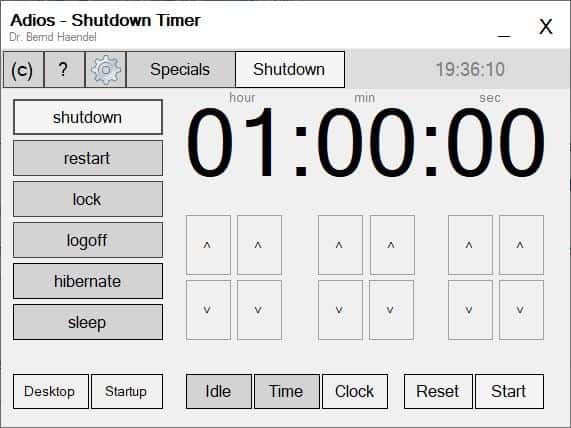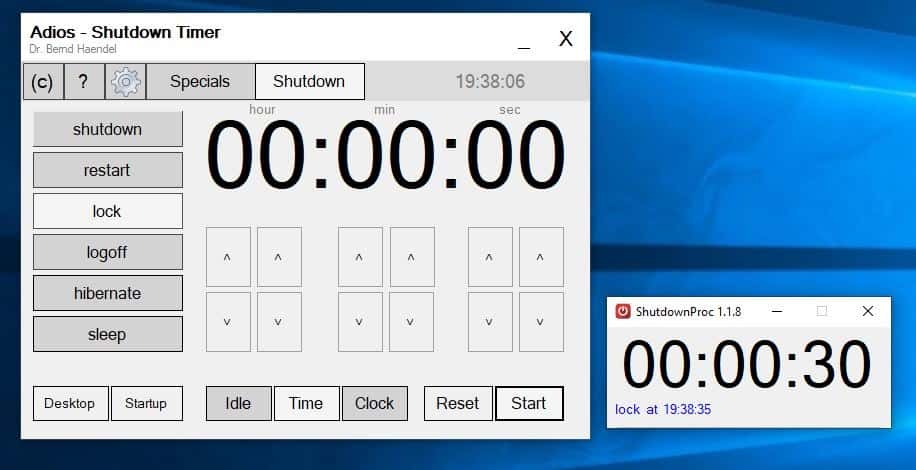Schedule your computer to shut down, restart, sleep with Adios - Shutdown timer for Windows

Not everyone shuts down their computer whenever they are finished with whatever they used it for. It's a good way to lower power consumption and also prevent an unexpected shutdown in case of a blackout (power outage).

Maybe you don't want the system running all night, in case you forgot to shut it and fell asleep. Or if you're downloading a large file and you want the system to shut down after sometime. These are some examples of why you may want to turn off the computer automatically. You may have a different reason and different options when it comes to a solution.
Adios - Shutdown timer is a freeware tool that lets you schedule your computer to shut down, restart, hibernate, sleep, lock, or log off automatically. It may look complex, but it's pretty easy to pick up. A clock is displayed in the top right corner and to the left you have some tabs.
Modes and Timers
The Shutdown tab is the main screen of the program. It has a side panel which lists six modes: Shutdown, Restart, Lock, Logoff, Hibernate, Sleep. See the large timer in the center of the screen and the arrow buttons below them? Use these to set up the time when you want the selected mode to be triggered. The three buttons at the bottom center depict the different timer types (Idle, Time and Clock).
The idle mode timer begins when there is no mouse or keyboard activity and when the timer ends, the action is triggered. Time mode is a countdown mode (for e.g. 1 minute, 10 minutes or 1 hour), when the timer reaches zero, Adios will run the command for the mode you chose. Clock mode runs the task at the precise hour and minute that you set, and executes the selected command. Don't forget to click the Start button, as that's what activates the task.
I recommend experimenting with the settings for a few minutes. The logoff and lock options are perfect for this, since you don't have to wait for the computer to start again. But, you should really test the shut down feature as well, to see if it works per your requirements.
Let's look at an example. Say you want to the computer to sleep after it has been idle for 1 minute. The first thing to do is to select "Sleep" from the side-panel, then click on Idle, set the timer to 1 minute, and hit the Start button. That's it.
Another example, if you want to lock the computer after 30 seconds, click Lock, Time, set 30 seconds as the timer.

Process Window and pop-up alert
Timers are opened as individual processes in a small pop-up window. The pop-up displays the action, timer type and the time trigger that you selected. If you close the window, it cancels the action. So, keep the timer process running in the background.
When an action is about to be triggered (for e.g. the computer is going to shut down), you'll see a pop-up (scrolls in near the system tray) on the screen that displays a countdown that serves as a reminder. It also plays a clock ticking sound that's pretty cool and helpful if you are near the device but cannot see the screen. The pop-up starts 10 seconds before the mode will be triggered, but you can configure this from the program's settings. Use this "grace period" to cancel the action, and continue using the computer
The Desktop and Startup buttons are used to create a shortcut, and to set the program to startup with Windows, respectively. Adios can be set to use the 24-hour clock or AM/PM for the time. There is a speech setting which has a male/female voice option. It's not a feature, but says the word "Adios" when you exit the application. You can disable it from the settings.
Specials
If you want to use Adios as a parental control program, use the "Time limit" option from the Specials tab to set a time-based limit for your kid's computer usage. It may be a good idea to use a password to logon to Windows, if you aren't already using one.
"Process" mode waits until a specific program that you select is closed and when it is, Adios will shut down the computer. The "Download" option works similarly, i.e. it waits for the file to be downloaded. The "Startup-Folder" acts as a shortcut for Windows' start-up folder.
Note: I was using version 1.2.8.6 for the review. The program seems to have been updated to version 1.2.8.8 today, but I don't see any major changes.
The application is written in .NET, and is also available in a portable version. Adios is easy to use and works pretty well.



























If it works, it needs more gadgets.
If it doesn’t work, it needs gadget cleaner gadgets.
Select “shutdown when finished” in a full backup job with Acronis or Reflect, that’s the pro way to ;-)
Not bad, but DShutdown is far more powerful and helpful:
http://dimio.altervista.org/eng/#DShutdown
Suum Cuique!
Some people needs a Porsche, some other a Fiat.
Thanks for “Not bad”
My computer already has a sleep and hibernate mode built into it.Would Adios even be necessary for my computer?
I never shut down my PC. Not even when I leave out, or for work. If I leave for a few daya yes, otherwise no. Electricity isn’t that expensive here.
Same here, except due to the slim fire hazard and security issues, I always turn it off and lock it up when I leave.
I think a lot of people leave their computers on all the time.
Who cares about our pollution and the future generations when we they can move to Mars eventually?
Ha.
I wouldn’t move to Mars, just so you know.
Isn’t that planet in a worse state than Terra? Afaik it is what, eventually, and inevitably, Terra will become too. Mars is one step closer to become Venus-like.
Eh, idk much about astronomy. It’s probably just nonsense what I just typed.
SchTasks /Create /SC Daily /TN “Restart Computer” /TR “Shutdown /r /f” /ST 23:00 /F
Intelligencia, check your BIOS settings. Some include settings to startup a computer at a specific time, especially systems aimed at business use. The only other methods I know of include task scheduler which you already checked. You have to check this before the regular startup of the system hitting DEL, F2 or possibly some other key. I hope you figure out your issue.
@leland
I appreciate the time you took to read my inquiry.
I will check the BIOS.
Thank You,
i
Hello Everyone:
I cannot seem to find the answer anywhere on the Internet so I’m turning to the G-hackers for some assistance. My question is relevant to the topic at hand (at least I think so).
I do NOT know why my laptop re-starts itself automatically at the same time each day at 6:45 AM – – even when I Shut it down the night before. The only way it does not come on by itself is when I unplug the electrical cord from its body the night before.
This phenomenon started happening about 2 months ago.
I was worried that perhaps malware of some sort had entrenched itself into my laptop and was “phoning” home. I also thought (perhaps) a Microsoft Update was the cause of this issue.
I even looked into the Windows built-in task scheduler but nothing has shown up there, either.
Any light you can shine on this issue is greatly appreciated.
Thank You,
i
If you’re on win 10 v1909, it could be this:
https://www.computerworld.com/article/3510463/bugs-continue-to-haunt-win10-version-1909.html
Try “powercfg/lastwake†in a command shell and look at what caused the awakening.
This has some details on other possibilities:
https://www.reddit.com/r/Windows10/comments/cqjo0a/stop_windows_10_awakening_your_pc_in_the_middle/
At a minimum, be sure the power switch is set to turn off the device, not one of the other options which quickly become problematic. A basic thing to check is whether these wakes are caused by the device or remotely by toggling wake on LAN in the network adapters settings.
I’m on 1909 but for any version of Windows, the only time a device woke up was when the power switch was set to sleep, back in Win 8.1 days.
intelligencia, there is a feature called Wake On Lan (WOL). In addition to what leland wrote (and in addition to your hypothesis), it’s also a possibility. You can learn about it on Wikipedia, or many other sources.
See:
https://en.wikipedia.org/wiki/Wake-on-LAN
Disconnet from your network and leave connected to power to test.
Check the task scheduler
task scheduler works fine too
“Not everyone shuts down their computer whenever they are finished with whatever they used it for.”
This is certainly true on Windows 10.
Boom goes the dynamite.
another fake portable app, very disgusting. launching the executable, it create a new folder in “%LocalAppData%” named “HP_Inc”, with another 2 subfolders within, and a “user.config” file that has the settings for the “portable” application. I have not yet watched in the registry, i hope that this crapware has not added more bullshit within.
I have tested download and use once more. I cannot see the reported behaviour!